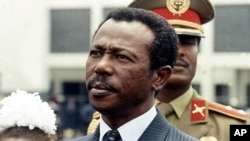Zimbabwe’s Foreign Affairs Minister Ambassador Frederick Shava has given the clearest sign ever that Harare is ready to extradite Ethiopian genocide fugitive and former President, Mengistu Haile Mariam.
In an exclusive interview with VOA Zimbabwe, Shava said, “If the people of Ethiopia approach the government of Zimbabwe, appropriate steps will be taken by the Government of Zimbabwe in response to the request, to the legitimate request from the government of Ethiopia.”
This marks a shift in policy as in an interview with VOA in 2009, Zimbabwe’s late former Information Minister, Tichaona Jokonya, said Harare was not going to extradite Mengistu.
Said Jokonya, “Mengistu came to Zimbabwe as a fugitive; he came as a refugee, and under the United Nations convention, a refugee is protected in the country he flies to.”
Mengistu was sentenced to death in 2008 in absentia after fleeing to Zimbabwe in 1991 following his ouster. He was charged with genocide, homicide, illegal imprisonment and property seizures.
Shava denied criticism that Harare is a safe haven for genocide fugitives after the United Nations accused it of harboring Rwandan fugitive, the late Protais Mpiranya.
He said Harare was not aware that Mpiranya was in the country until after he was found dead by a United Nations team tracking him down.
The United Nations said he died at the age of 50 in 2006 and was buried at one of the poorest grave yards in Harare, Granville Cemetery, located 15 km from the city centre.
“We are not harboring Mr. Menguistu, we have allowed Mr. Mengistu to stay in Zimbabwe since he fell out with his people in Ethiopia. It was not a conspiracy, everybody knew he was coming here with his family, and there is no comparison with what you are asking about (Mpiranya).”
Shava told VOA that Harare had “fully co-operated with the UN Residual Mechanism in its investigations of the Rwandese fugitive who was indicted in 2000 by the International Criminal Court for his role in the 1994 Rwandan genocide.”
But the Rwandan Embassy in Harare issued a terse Twitter response to Shava saying, “The embassy wishes to advise the correction of ‘1994 Genocide against the Tutsi’s in Rwanda’ as opposed to the way (it) is mentioned in the statement.”
Shava also told VOA Zimbabwe Service that Harare had taken delivery of the UN report and welcomes the findings from the DNA samples extracted from Mpiranya.
He promised that the country will investigate how Mpiranya was able to evade capture in the country until his death in 2006.
A statement from the United Nations late last year though said, chief Prosecutor Serge Brammertz of the United Nations International Residual Mechanism for Criminal Tribunals (Mechanism), who visited Harare in November and met with Vice President Constantino Chiwenga and Justice Minister Kazembe Kazembe, told the United Nations Security Council in May 2021 that “full and effective cooperation from the Republic of Zimbabwe is essential to move forward critical investigations, including the documented presence of a fugitive in Zimbabwean territory.” The tribunals were set up to bring to justice genocide fugitives from Rwanda and Yugoslavia.
Harare also agreed to set up an Inter-Agency Task Force to provide “assistance to the Mechanism Office of the Prosecutor.”
In 2012, Zimbabwe Police Officer Commanding Central Investigating Homicide Section, Chief Superintended Peter Magwenzi, declared that they wanted Mpiranya “dead or alive”, telling VOA at the time that they had received a number of leads on his whereabouts though he called the matter “very sensitive.”
However, human rights lawyer, Kennedy Masiye, who represented missing Zimbabwean human rights activist Itai Dzamara who was abducted by alleged state security agents in Harare in 2015, said Harare was very much aware that Mpiranye was in the country.
Masiye said Harare has a track record of harboring genocide fugitives as Mengistu has not been brought to justice enjoying protection from Harare.
“Zimbabwe has refused to ratify international laws against torture or ratify the Rome Accords to be a member of the International Criminal Court, that shows its lack of seriousness in dealing with genocide fugitives.”
Mpiranya was regarded by some analysts as Africa’s most wanted fugitive having avoided capture for two decades even with a US$5 million reward from the United States Department of State.
According to a statement from the State Department, “Mpiranya, the former commander of the Presidential Guard of the Rwandan Army, is wanted for taking part in the 1994 Genocide in Rwanda.”
It adds, adds that in April 1994, as violent Rwandan extremists were launching a bloody campaign of ethnic cleansing, Mpiranya led the Presidential Guard Battalion. He is accused of playing a key role in planning the genocide, including training military groups and distributing weapons.
The Presidential Guard, under Mpiranya’s command, is accused of assassinating Prime Minister Agathe Uwilingiyimana and 10 Belgian peacekeepers detailed as her bodyguards. Throughout the genocide, the Presidential Guard was reportedly a major driving force of lawlessness and destruction.”
The term genocide is a combination of the Greek word genos (meaning race) and Latin word “cide (meaning killing) and was coined by Polish lawyer and author of the 1944 book, Axis Rule in Occupied Europe in which he first used the word.




